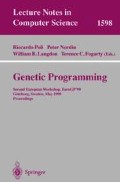Abstract
The paper presents the abstraction transformation which is a fundamental method for creating functions in ADATE. The use of abstraction turns out to be similar to evolution by gene duplication which is emerging as the most important theory of “building blocks” in natural genomes. We discuss the relationship between abstraction and its natural counterparts, but also give novel technical details on automatic invention of functions. Basically, abstraction is the reverse of the inlining transformation performed by optimizing compilers.
Access this chapter
Tax calculation will be finalised at checkout
Purchases are for personal use only
Preview
Unable to display preview. Download preview PDF.
References
A. W. Appel, Modern compiler implementation in ML, Cambridge University Press, 1998.
T. Endo, T. Imanishi, T. Gojobori and H. Inoko, Evolutionary significance of intra-genome duplications on human chromosomes, Cell, number 205, December 31, 1997, pp. 19–27.
D. B. Fogel, Evolutionary Computation: Toward a New Philosophy of Machine Intelligence, IEEE Press, 1996.
W. S. Klug and M. R. Cummings, Essentials of genetics, Prentice-Hall, 1999.
J. R. Koza, Genetic programming: on the programming of computers by means of natural selection, MIT Press, 1992.
J. P. Nordin, Evolutionary program induction of binary machine code and its applications, Krehl Verlag, Münster, 1997.
S. Ohno, Evolution by gene duplication, Springer-Verlag, 1970.
J. R. Olsson, Inductive functional programming using incremental program transformation and Execution of logic programs by iterative-deepening A * SLD-tree search, Research report 189, Dr scient thesis, ISBN 82-7368-099-1, University of Oslo, 1994.
J. R. Olsson, Inductive functional programming using incremental program transformation, Artificial Intelligence, volume 74, number 1, March 1995, pp. 55–83.
J. R. Olsson, Web page for Automatic Design of Algorithms through Evolution, http://www-ia.hiof.no/~rolando/adate_intro.html (current Nov. 23, 1998).
J. R. Olsson, Population management for automatic design of algorithms through evolution, International Conference on Evolutionary Computation, 1998.
Å. Wikström, Functional Programming Using Standard ML, Prentice Hall International, 1987.
Author information
Authors and Affiliations
Editor information
Editors and Affiliations
Rights and permissions
Copyright information
© 1999 Springer-Verlag Berlin Heidelberg
About this paper
Cite this paper
Olsson, J.R. (1999). How to Invent Functions. In: Poli, R., Nordin, P., Langdon, W.B., Fogarty, T.C. (eds) Genetic Programming. EuroGP 1999. Lecture Notes in Computer Science, vol 1598. Springer, Berlin, Heidelberg. https://doi.org/10.1007/3-540-48885-5_20
Download citation
DOI: https://doi.org/10.1007/3-540-48885-5_20
Published:
Publisher Name: Springer, Berlin, Heidelberg
Print ISBN: 978-3-540-65899-3
Online ISBN: 978-3-540-48885-9
eBook Packages: Springer Book Archive

